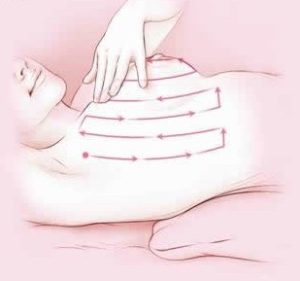
Many women rely strictly on screening mammograms to detect breast cancer. Although mammogramsA low dose x-ray picture of the breast that allows a doctor to view glandular tissue and determine the presence of cancer. are one of the most effective ways to detect cancer in its earliest stages, they can miss up to 20 percent of breast cancers. Breast self examination (BSE) can be another effective method of early detection, when practiced monthly. If you haven’t been regularly checking your breast tissue, keep some of these helpful tips in mind:
DO
- Check your breasts every month. Check yourself a week after your period starts when swelling and sensitivity are less. If you don’t have a regular period, just check yourself the same day every month.
- Keep in mind, we have a natural lumpiness in our breast tissue. This can feel lumpy like oatmeal or gritty similar to sand on a beach. With practice, you will learn the blueprint of your breast tissue. Any changes should be reported to your medical professional.
- Know where to check. The perimeter for each breast runs from your collarbone to your armpit down to the bra line, across to your breastbone and up to the notched “V’ of your collarbone. This entire area needs to be checked.
- Use the vertical strip pattern, otherwise known as the MammaCare method. Older “spoke” or “circular” patterns can miss a tremendous amount of breast tissue. Download your self-exam guide.
- Have confidence in your ability to find lumps as small as 3mm, if you check yourself every month.
DON’T
- Don’t check yourself in the shower. Follow the MammaCare instructions on positioning yourself in bed which leads to a more even distribution of your breast tissue.
- Don’t use lotion; perform your self-check with dry hands on dry skin. You don’t want any barrier between your fingertips and chest tissue.
- Don’t skip the nipple, nearly 20 percent of lumps in women may be found in this area. Most men find their lumps under the nipple.
- Don’t panic if you find a lump. Eighty percent of lumps found in our chest tissue are benignNot harmful; not cancerous (referring to a cell or mass). (harmless).
- Don’t overlook a visual inspection of your breasts. Any changes in skin texture , shape, vein patterns, rash or unusual discharge should be reported to your physican.
- Don’t forget to lock your bedroom door-especially if you have small kids or roommates who may interrupt!